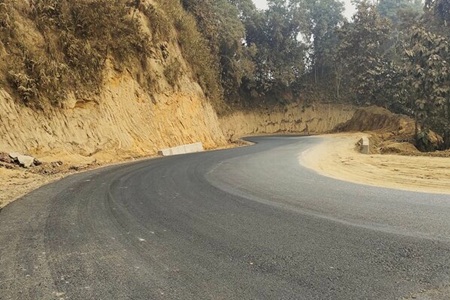
Tripura, a northeastern Indian state known for its lush greenery, has been navigating a delicate balancing act between development and environmental conservation. While the state has witnessed significant infrastructure development, particularly in terms of highway expansion, these projects have inevitably led to the felling of numerous trees.
Going by the figures given by Forest Minister Animesh Debbarma in the Assembly over the past two years, the Tripura government has cleared over 11,460 old trees to widen national highways. While this decision was made to improve connectivity and facilitate economic growth, it has raised concerns among environmentalists and conservationists. The loss of trees not only impacts the ecological balance but also contributes to deforestation, a pressing issue in many parts of India.
In response to these concerns, the minister informed the House, the state government has implemented several reforestation initiatives. One such initiative is a mandatory tree planting policy that requires the planting of ten trees for every tree felled for construction or development purposes. This policy aims to offset the environmental impact of development projects and promote sustainable practices.
In addition to the mandatory tree planting policy, the Tripura government has also launched a large-scale plantation drive. This initiative aims to plant 5 lakh saplings in 5 minutes and has involved various stakeholders, including students, clubs, organizations, banks, and security forces. The goal is to increase the state’s forest cover and restore the ecological balance, said Debbarma.
Despite the challenges posed by deforestation, Tripura’s current forest cover remains relatively high at over 62%. This is a testament to the state’s commitment to environmental conservation and its efforts to protect its natural resources. However, the state faces several challenges in its reforestation efforts, including ensuring successful tree survival, addressing climate change-related threats, and balancing the needs of various stakeholders.
One of the key challenges in Tripura’s reforestation efforts is ensuring the survival of the newly planted saplings. Factors such as climate change, pests, and diseases can significantly impact the success of reforestation initiatives. The state government must implement effective measures to protect the saplings and ensure their growth and development.
Another challenge is addressing the impacts of climate change, which can exacerbate deforestation and hinder reforestation efforts. Rising temperatures, changes in rainfall patterns, and extreme weather events can all contribute to the loss of forests and make it difficult to restore degraded ecosystems. The Tripura government must develop strategies to adapt to climate change and mitigate its impacts on forests.
The balancing the needs of various stakeholders is essential for successful reforestation efforts. While environmentalists and conservationists advocate for preserving forests, development interests often push for clearing land for infrastructure projects. The Tripura government must find ways to reconcile these competing interests and ensure that development is carried out in a sustainable manner.
In conclusion, Tripura’s efforts to balance highway expansion with forest conservation are commendable. The state government’s reforestation initiatives and commitment to environmental protection are important steps towards ensuring a sustainable future. However, addressing the challenges posed by deforestation, climate change, and stakeholder interests is crucial for the success of these efforts. By implementing effective strategies and policies, Tripura can protect its forests, promote sustainable development, and create a greener and more resilient future for its citizens.


